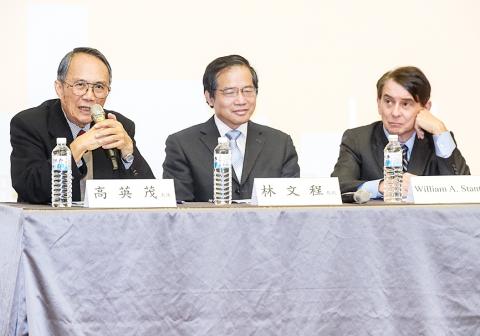US President Donald Trump’s unpredictability makes him “kind of afraid” of what might happen if Trump’s reported meeting with Chinese President Xi Jinping (習近平) next month in the US occurs, former American Institute in Taiwan (AIT) director William Stanton said yesterday.
Stanton, who led the AIT’s Taipei office from 2009 to 2012 during then-US president Barack Obama’s presidency, spoke to reporters in Mandarin on the sidelines of a forum in Taipei about Taiwan’s strategic planning during Trump’s term in office.
The forum was hosted by the Taiwan Forever Association and the International Committee for a Democratic Taiwan, and Stanton was one of the panelists.

Photo: Huang Yao-cheng, Taipei Times
While it is hard to predict what Trump and Xi would talk about when they meet, many political analysts have noticed the new US president’s inclination to pay little attention to policy issues during his meetings with foreign heads of state, Stanton said.
“From what I heard, during Trump’s meeting [last month] with Japanese Prime Minister Shinzo Abe, the US side did not even have someone there to take minutes and it had to use those kept by the Japanese afterwards,” Stanton said.
“That is why I am kind of afraid about his meeting with the Chinese leader, because I do not know if he is ready,” Stanton added.
Asked whether the Trump-Xi meeting would bode ill for Taiwan, Stanton said he was unsure, but added that he believed the biggest problem would be Trump’s tendency to flip-flop on issues and make conflicting statements.
He added that as Trump is more business-centric, Taiwan might not appear as valuable to him as in the eyes of Obama, who valued Taipei’s democratic achievements.
Turning to cross-strait issues, Stanton said he is of the opinion that President Tsai Ing-wen (蔡英文) has made a serious effort to maintain the “status quo” and ensure peace across the Taiwan Strait.
“However, it seems that the Chinese government is still not satisfied and insists on the so-called ‘1992 consensus,’” Stanton said, urging Beijing to respect the opinions of the Taiwanese, the majority of whom disagree with China’s viewpoints.
The “1992 consensus” refers to a tacit understanding between the Chinese Nationalist Party (KMT) and the Chinese Communist Party that both sides acknowledge there is “one China,” with each side having its own interpretation of what “China” means.
In 2006, former Mainland Affairs Council chairman Su Chi (蘇起) admitted making up the term in 2000, before the KMT handed power to the Democratic Progressive Party.
Tsai’s refusal to acknowledge the “1992 consensus” has resulted in several punitive measures by Beijing.

Taiwanese can file complaints with the Tourism Administration to report travel agencies if their activities caused termination of a person’s citizenship, Mainland Affairs Council Minister Chiu Chui-cheng (邱垂正) said yesterday, after a podcaster highlighted a case in which a person’s citizenship was canceled for receiving a single-use Chinese passport to enter Russia. The council is aware of incidents in which people who signed up through Chinese travel agencies for tours of Russia were told they could obtain Russian visas and fast-track border clearance, Chiu told reporters on the sidelines of an event in Taipei. However, the travel agencies actually applied

Japanese footwear brand Onitsuka Tiger today issued a public apology and said it has suspended an employee amid allegations that the staff member discriminated against a Vietnamese customer at its Taipei 101 store. Posting on the social media platform Threads yesterday, a user said that an employee at the store said that “those shoes are very expensive” when her friend, who is a migrant worker from Vietnam, asked for assistance. The employee then ignored her until she asked again, to which she replied: "We don't have a size 37." The post had amassed nearly 26,000 likes and 916 comments as of this

New measures aimed at making Taiwan more attractive to foreign professionals came into effect this month, the National Development Council said yesterday. Among the changes, international students at Taiwanese universities would be able to work in Taiwan without a work permit in the two years after they graduate, explainer materials provided by the council said. In addition, foreign nationals who graduated from one of the world’s top 200 universities within the past five years can also apply for a two-year open work permit. Previously, those graduates would have needed to apply for a work permit using point-based criteria or have a Taiwanese company

The Shilin District Prosecutors’ Office yesterday indicted two Taiwanese and issued a wanted notice for Pete Liu (劉作虎), founder of Shenzhen-based smartphone manufacturer OnePlus Technology Co (萬普拉斯科技), for allegedly contravening the Act Governing Relations Between the People of the Taiwan Area and the Mainland Area (臺灣地區與大陸地區人民關係條例) by poaching 70 engineers in Taiwan. Liu allegedly traveled to Taiwan at the end of 2014 and met with a Taiwanese man surnamed Lin (林) to discuss establishing a mobile software research and development (R&D) team in Taiwan, prosecutors said. Without approval from the government, Lin, following Liu’s instructions, recruited more than 70 software